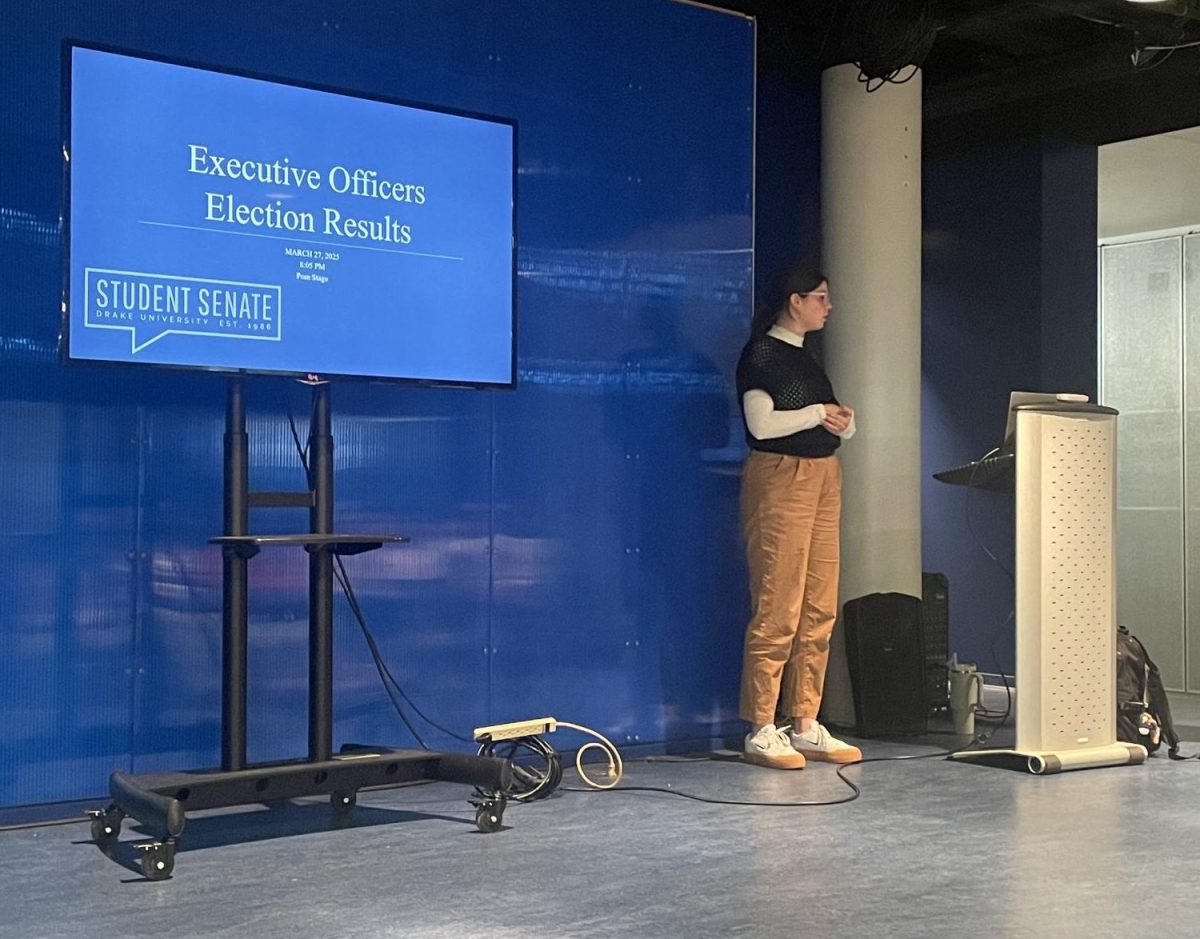STORY BY SARAH FULTON
Student Senate, in a closed session, allocated $30,000 to bring a band to campus for the Relays Concert after the annual event lost sponsorship of Court Avenue businesses.
To pursue a bigger name band for the Relays concert, the Student Activities Board (SAB) requested and received the money from the Quasi Endowment Fund.
The fund, which began in 2005, is created through excess student activity fees that are placed in an interest-bearing endowment. Now, the fund has accumulated roughly $200,000.
Court Avenue pulled their sponsorship because “they were not feeling the full benefit” since a large number of attendees are underage and cannot go to the downtown bars, said Adam Graves, student senate vice president of student activities and SAB president.
“They felt that they were not getting enough money for the amount that they were paying, so they chose not to host it anymore,” Graves said.
SAB also planned to hire 3OH!3, a larger and more expensive act than in past years.
The organization’s remaining funds were insufficient to hire the band and accommodate the lost sponsorship.
The combination of events caused SAB to move the concert on-campus to the Drake Plaza, adjacent to the stadium, and request funds from the Quasi Endowment Fund.
On March 26, Senate approved the $30,000 funding request during a closed session, in order to keep the band name a secret until Blitz Day on April 8.
However, some felt a negative precedent was set surrounding the Quasi Fund usage and the relationship between Student Senate and SAB.
“When we drew the numbers out SAB wanted to bring a pretty substantial band and didn’t have the funds to do so,” Student Senate President Joey Gale. “We created a motion to spend from the Quasi because we thought that would be the most responsible avenue to do that.”
The closed session vote was unanimous among Senators in attendance.
Student Senate treasurer Kevin Maisto was absent from the vote, but he was frustrated the motion was not brought through him or his committee, the Student Finance Allocation Committee (SFAC). He said the allotment of money is “extremely unsustainable.”
“I understand their rationale,” Maisto said. “They wanted a good band with a big name and to not have budget restrictions around it. However, my primary concern regarding it was that there was not any student oversight over it.”
Student organizations are required to present to SFAC before requesting one-time funding from Student Senate. However, since the Quasi Endowment Fund request came from Graves, the Student Senate Vice President of Student Activities and SAB President position, he was able to bring the motion directly to Senate.
“The Quasi Fund is a little bit different because I am a Senate member,” Graves said. “I do go through the Quasi Fund and it does not necessarily need to be approved through SFAC or the treasurer because the treasurer oversees the one-time funds and all of Senate oversees the Quasi Fund.”
Gale said that for every year data is available Student Senate has spent 91 percent of their $300,000 budget. Each year the remaining money was added to the Quasi Fund. The 2015-2016 Senate budgeted for a deficit to help ensure all the money is spent.
Senate also recently established an Ad Hoc committee to set up specific guidelines around what money from the fund can be used and what the request process should be. However, some feel there is currently a lack of regulations and clarity.
“I would not say it is necessarily an issue that we have this amount of money but I think the issue is that we do not have strongly define guidelines, regulations around it,” Gale said.
Some feel accountability is lacking because the general student body does not know about the Quasi Fund.
SFAC member Keith Guenet said that while Senate is not being “tricky” with the money, most students do not know where it goes or that the Quasi Fund exists.
This means that they cannot effectively hold Senate “accountable.” Gale agrees that students “do not understand as much as they should.”
“I would say from what I am familiar with students may have a general understanding of the student activity fee they pay, which is the $73 per semester fee,” Gale said. “They have a general understanding of that. From there it gets blurry. It kind of gets fuzzy.”
More question around the Quasi Fund revolve around what the money should be used for.
“Senate views that money as what they can spend any whatever they want. They feel like they can use it in an emergency situation but what is an emergency situation?” SFAC member Keith Guenet said.
Past motions from the fund include a $70,000 allocation for a new piano in the Harmon Fine Arts Center and money for the world’s largest pie fight at the inaugural Dogtown After Hours.
Gale said that determining the appropriate use of the money is part of the purpose of the new Ad Hoc committee.
“Students that graduated three, four, five years ago, it is their money.,” Gale said. “So if you think about it like that how does that change how we spend it?”
Another way the use of the Quasi Fund could differ is based on organizational representation in Senate.
Seven years ago, Student Senate was set up in “silos,” Gale said. Organizations and other “tangible” entities like the Residence Hall Association and Athletics had Senators.
Now Senate positions are based around “a function of the University” like community outreach. The change saw a reduction in the number of Senate seats and organization representation.
“To the extent that we lose more voice that is 100 percent valid,” Gale said. “If we have one less voting member around the table then we lose that aspect. I think there is also that aspect where our Student Senate meetings are open.”
Gale said having more representation around the Senate table might have changed the outcome of the most recent Quasi Fund motion but it did have a great deal of support.
“To be honest I am not sure (how it would change)” Gale said. “The motions that we did pass, especially for the Relays Band, was close to unanimous.”
The one organization that still has some form of representation at Student Senate is SAB through Graves’ position.
As Vice President of Student Activities, Graves is automatically the President of SAB.
However, there are a variety of student definitions regarding the exact purpose of the combined position.
Graves said his position is as an “overseer” of “student activities in general.” He said it is “more broad” than just being the SAB President. He tries to foster collaboration between organizations and “be a voice for all student activities.”
In part, Gales agrees. He said that was the original purpose of the position but it now functions as “just the president of SAB.”
“That position was designed for that and I am not entirely sure why it strayed away from that type of narrative,” Gales said. “I think the time they do focus on SAB is well worth it.”
While Guenet admits there is a lack of clarity surrounding the Quasi Fund and Graves’ position, creating transparency about the Student Senate to students should be the main focus.
“Just look at how many people vote in these elections,” Guenet said. “Only when elections come around do people actually care. Then it is mostly a popularity contest. How well people recognize the names. There is not accountability.”









